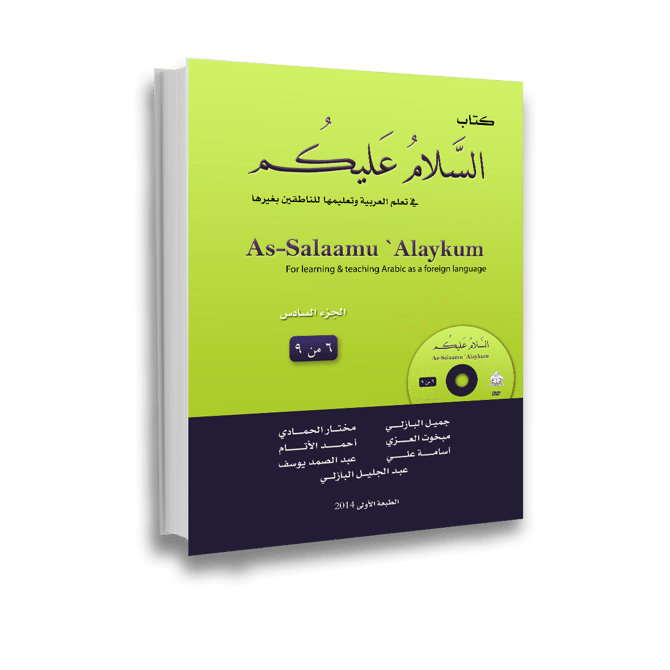
ASSALAMU 'ALAYKUM TEXTBOOK PART SIX
After completing this textbook, the learners will be able to:
- Talk about and discuss concrete and abstract issues of Arab life, and present their points of views. These issues include social rituals, family and childhood, Arabic literature, confrontation or dialogue & terrorism, sports, Arab Spring, and compare these issues with similar or different issues from the learners’ culture.
- Identify the author’s point of view, and agree or disagree with the author, and support their opinions with evidences.
- Comprehend in details the texts they hear.
- Summarize the topics they learn orally and in written, and they make use of the internet environment to help them.
- Exercise morphological rules including: quadrilateral root (????), ((?????, (?????), present participle &past participle derived from quadrilateral roots, the derivations of quadrilateral root (past, present, and passive”, place nouns, time nouns, tool/machine nouns, exaggeration formation (?????, ??????, ??????, ????, ????, ???).
- Know new grammatical rules including: nominal sentence and verbal sentence with ???, nominal sentence with ???and other similar particles, nominal sentence with ??? and other similar verbs, specification after (superlative ), circumstantial expression or phrase, exclamation (?? ????!) , condition particles, the thing excepted with the particles (???? ???? ???), the exception syntax.
- Distinguish between silent hamzah, and pronounced Hamza (?, and ?) and the rules of hamzah when it comes in the middle of the word on (?), (?), alif elision from some words, silent hamzah elision from some nouns, and the hamzah when it comes at the endings of words.
- Realize cultural aspects consistent with topics presented in this textbook such as Arab generosity, wedding rituals in the Arab world, giving a name to a child in the Arab culture, specifications of Arab family, importance of poetry, Arab proverbs and a few examples, Islam as religion of moderation, Arab horsemanship, types of TV channels in the Arab world, and Arab Spring.
- Use learning strategies such as: 1) Summarizing films shown in Arabic and preparing presentations to be presented in the classrooms and sharing them on the social media, b) discussions, and debates on the topics studied in this textbook, and summarizing these discussions in written, and c) searching the internet for information related to the topics and issues presented in this textbook.

